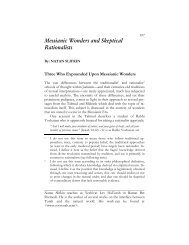Is There a Disconnect between Torah Learning and ... - Hakirah.org
Is There a Disconnect between Torah Learning and ... - Hakirah.org
Is There a Disconnect between Torah Learning and ... - Hakirah.org
You also want an ePaper? Increase the reach of your titles
YUMPU automatically turns print PDFs into web optimized ePapers that Google loves.
28 : Hạkirah, the Flatbush Journal of Jewish Law <strong>and</strong> Thought<br />
they reached the age of young adulthood, it became glaringly<br />
apparent that they had failed to develop emotionally <strong>and</strong> to develop<br />
sensitivity for others. Their parents were afraid to take them to the<br />
chupah for fear of how they would treat their wives <strong>and</strong> children.<br />
We need to teach our children to give up their seats to older<br />
people, be it at home, on a bus, or in shul. <strong>There</strong> was a time when this<br />
was the norm. If a grown-up came into shul, <strong>and</strong> there did not seem<br />
to be a place for him, fathers would immediately tell their children to<br />
get up <strong>and</strong> give their seat to the adult. 23<br />
• Today this is not the norm. I know people who have shown up at<br />
in a strange shul <strong>and</strong> found an empty seat, only to be שמחות<br />
shooed away by someone saying that it is his ten-year-old son’s<br />
seat. One person told me this happened to him three times at one<br />
hallway. He finally just gave up <strong>and</strong> davened in the .שמחה<br />
• An elderly man recently told me that he walked into a shul,<br />
noticed one empty seat, <strong>and</strong> headed toward it. As he was nearing<br />
the seat, one of the already seated men motioned to his son to<br />
quickly grab the seat before the elderly man could get to it. What<br />
message was this man giving to his son?<br />
It would help if we would teach our children to hold a door open<br />
for someone behind them who is about to walk through it. And, if as<br />
some have told me, they are uncomfortable doing that, lest the<br />
person for whom they would be holding the door open be a member<br />
of the opposite gender, let them not look back! Whatever they do,<br />
they should not allow the door to slam in the face of the person<br />
behind them. Saying “please,” “thank you,” <strong>and</strong> “excuse me” 24 would<br />
not hurt either.<br />
23 I cannot say that this was always done in the most decorous or<br />
respectful way. Often children were unceremoniously “shooed away”<br />
from their seats. And, they probably resented it. It can <strong>and</strong> should be<br />
done in a manner that respects the child as a person. The reason for<br />
giving up the seat should be explained to the child, <strong>and</strong> s/he should be<br />
given the opportunity to feel that he is doing a mitzvah rather than just<br />
being chased away.<br />
24 I do not of course mean the use of this term in the “attack mode”<br />
commonly used in <strong>Is</strong>rael. <strong>There</strong>, if you hear לי ,תסלח usually you know<br />
that trouble is looming.
















